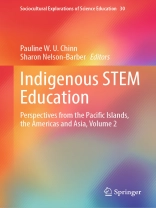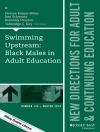This book builds upon the range of Indigenous theory and research found in Volume I and applies these learnings to interventions in schools, communities, teacher education and professional development. It is part of a two-volume set addresses a growing recognition that interdisciplinary, cross-cultural and cross-hybrid learning is needed to foster scientific and cultural understandings and move STEM learning toward more just and sustainable futures for all learners.
Authors working in Eurocentric settings of schools and colleges—whether in the continental or island United States, Canada, Thailand, Taiwan or Chuuk—utilize storytelling, place, language and experiential learning to engage students in meaningful, highly contextualized study that honors ancestral knowledge and practices. They recognize that their disciplines have been structured and colonized by Eurocentric/American frameworks that lack storied, ethical contexts developed through living sustainablyin particular places. Recognizing that students seeking to enter STEM majors and careers now must be knowledgeable in multiple ways, authors describe innovative ways to immerse precollege learners as well as developing and practicing teachers in settings that intersect culture, place, heritage language, and praxis that enable Indigenous and local knowledge to become central to learning. Twenty-first century technologies of distance learning, digital story-telling, and mapping technologies now enable formerly marginalized, minoritized groups to share their worldviews and systems of knowledge.
Tabela de Conteúdo
PART I: INDIGENOUS INNOVATIONS AND INTERVENTIONS IN SCHOOLS AND COMMUNITIES.- Chapter 1. Utilizing Indigenous knowledge systems and Western science in science education (DANIEL LIPE).- Chapter 2. Mathematics education on a worldwide voyage: Engaging values and place-based curriculum to support college, career, and community readiness (LINDA H. L. FURUTO).- Chapter 3. Kokākoukula, kokākou home pāhanainoa hale kula: Our school, our home; A place-based curriculum project on school building names (SHAWN MAPUANA KOBASHIGAWA).- Chapter 4. Changes in students’ science concepts and discourse: A case study of place‐based education in rural Thailand (NANTANA TAPTAMAT).- Chapter 5. Way Finding: Túúttúnnapen Chuuk. Indigenizing Chuukese Education (MARGARITA B. CHOLYMAY, L.J. RAYPHAND AND JAMES SKOUGE).- PART II: PROGRESS TOWARDS INDIGENIZING TEACHER EDUCATION AND PROFESSIONAL LEARNING.- Chapter 6. The will of the ancestors—a collaborative elementary science curriculum design initiative (APALAH- JAMES AYULUK, NAQUCIN-FLORA AYULUK, AND CIKIGAQ-IRASEMA ORTEGA).- Chapter 7. Science and Story (DAVID B. ZANDVLIET, BARBARA J. WILSON (KII’ILJUUS), CARLOS G.A. ORMOND, JASON ALSOP (GAAGWIIS)).- Chapter 8. Forum Place-based curriculum in Indigenous settings: Stories behind two signature projects (IRASEMA ORTEGA AND DAVID ZANDVLIET).- Chapter 9. Learning from our place, learning from each other (CORRIN BARROS, EMERSON LOPEZ ODANGO, JUANITA S. R. LAWRENCE AND JOYMINDA GEORGE).- Chapter 10. A‘o Hawai‘i: The role of culture and place in empowering teacher leaders as STEMS2 educators (TARA O’NEILL, ANNA AH SAM, SHARI JUMALON, KIMBERLEE STUART, AND MARY ANNA ENRIQUEZ).- Chapter 11. The effects of place-based ecological modules on Indigenous Taiwanese students’ science learning (TSUNG-WEI YAO, HSUAN-FANG HUNG, CHIA-LING CHIANG, SU-FEN LIN, AND CHIUNG-FEN YEN).- Chapter 12. Final Thoughts (PAULINE W. U. CHINN AND SHARON NELSON BARBER).
Sobre o autor
Pauline W. U. Chinn’s great-grandparents arrived in Hawaiʻi when it was the Kingdom of Hawaiʻi and Hawaiian was the official language. After the Kingdomʻs illegal overthrow in 1893 and annexation by the United States in 1898, Hawaiian language was forbidden in education and government until a constitutional amendment in 1978. As a science teacher in Hawaiʻi’s public schools, she used textbooks from the continental U.S. except in Plants and Animals of Hawaiʻi, a class for non-college bound students. Creating a place-based curriculum allowed her to intersect her fishing, hiking, and gardening experiences with western biology frameworks. Seeing students in this “terminal” class become engaged as their lives and places entered the curriculum led to doctoral research exploring the roles of culture, gender, language, place, and power in underrepresentation of Kānaka Maʻoli, descendants of Polynesian voyagers, in science, technology, engineering, and mathematics (STEM). At the University of Hawaiʻi at Mānoa, her teacher education and professional development projects funded by the U.S. Department of Education and the National Science Foundation support research and education to develop teacher leaders who create place-based, culturally sustaining, inquiry-oriented curricula inclusive of diverse and underrepresented students. This work led to establishing an Interdisciplinary M.Ed. Place-based, Sustainability and a Graduate Certificate in Sustainability and Resilience Education.
Sharon Nelson-Barber, a sociolinguist and Senior Program Director at West Ed, has lifelong personal and professional experience in Indigenous communities. Her interests in STEM began early on as she accompanied her father and grandfather while subsistence hunting and fishing. Much of her research, funded by the National Science Foundation, centers on understanding ways in which students’ cultural backgrounds influence how they make sense of mathematics and science education. She also conducts studies aimed at developing more equitable assessment and testing methods that account for cultural influences. She closely collaborates with other Indigenous researchers and community partners across the US, the Northern Pacific islands of Micronesia, and parts of Polynesia. She is co-founder of POLARIS (Pivotal Opportunities to Learn, Advance and Research Indigenous Systems), a research and development network that promotes healthier communities by integrating Indigenous perspectives for thriving education futures. An ongoing project convenes Indigenous elders and scientists to document technical solutions to climate change from both Indigenous and western academic perspectives, and heighten international attention to the need to preserve cultures and societies amidst rising waters.












